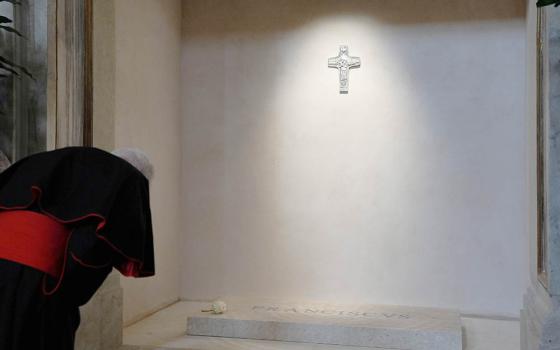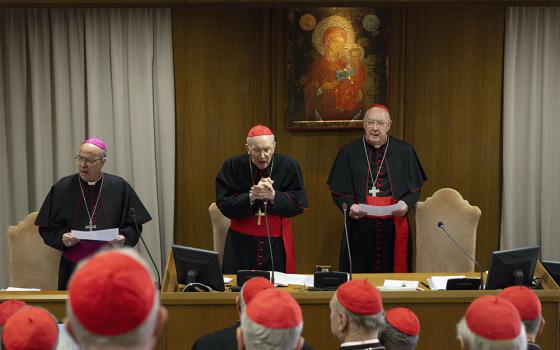This Thursday, President Obama will visit Pope Francis. The pictures alone will set certain conservative hearts on edge and make liberal Catholics swoon. But, will the visit yield more than a photo-op for a president struggling with low poll numbers? Can we expect anything of substance to emerge from the meeting, or at least for some seeds to be planted that might yield a harvest later on?
The visit can be looked at from a variety of angles. The first thing to note is that both men will be fully briefed and, therefore, fully aware that the American bishops who are most aggressively hostile to Obama are also the American bishops who have been most resistant to Pope Francis. Archbishop Chaput famously accused the University of Notre Dame of prostituting its Catholic identity by inviting Obama to give a graduation speech in 2009 and it was also Archbishop Chaput who felt the urge to republish emails complaining about Pope Francis last summer, accompanied by a tepid defense of the new pope. Bishop Morlino of Madison did everything but wear a “Romney/Ryan” button on his miter in 2012, and he recently gave an interview about Pope Francis that was equal parts grudging and condescending towards the pope. And, Bishop Tobin of Providence complained about Obama in very harsh terms before complaining he was “disappointed” that Pope Francis did not spend more time talking about abortion. Both Obama and Francis are Christians, and we Christians are encouraged to view no man as an enemy, yet the phrase, “the enemy of my enemy is my friend,” does leap to mind.
The two men have vastly different personalities. This visit will see a role reversal from when President George W. Bush met with Pope Benedict. Bush was an earthy evangelical and Benedict the austere, somewhat aloof, intellectual. In this case, it is the president who is known for his aloofness and intellectual rigor and Francis, while no slouch intellectually, who possesses the common, earthy touch. Will there be a meeting of the minds between these two very different personalities?
This question leads to another, and deeper, difference between the two men. Obama is a thoroughly modern man, a quintessential Cartesian. He is famous for saying that “good policy is good politics,” and he still seems to really believe that, despite his sinking poll numbers which counsel otherwise. Obama looks at the world through a technocratic lens and only in campaign season does he allow his person to embody his causes. As the New York Times relayed yesterday, Obama may have community organizing roots in the Catholic churches of Chicago, but there is nothing of the Catholic worldview or culture in the man.
Pope Francis, on the other hand, is not ashamed to talk about Satan. He does not speak of the Evil One as embodied in his ecclesiastical opponents the way some of Obama’s political opponents speak of the president. But, Pope Francis does not look at the world through a technocratic lens, but as a place where grace and evil are choices we all confront, where the great drama of salvation is playing itself out. He does not see policies: He sees people. As I noted last week, the pope does not, in fact, speak very frequently about poverty. He speaks about the poor. This is because Pope Francis has one cause, and that cause is a person, Jesus Christ, and the pope embodies that cause at all times, not just at campaign season which, given his office, he never has to endure again.
Finally, these two very powerful men have completely different sources of power. President Obama leads the world’s largest economy, largest military, most technologically advanced culture, and must govern by rules and expectations different from those set out in the Sermon on the Mount. Pope Francis’ power comes not just from his office but from his counter-cultural witness in that office. In a culture drowning in consumerism, he lives simply. In a world plagued by violence, he prays for peace. In an ecclesial society known for formality and ceremony, he is informal and unceremonious. As noted, both men face opposition and for Francis, the opposition is not open and down the street, it is downstairs and it is quiet, but his “weapons” are not those of belligerence but persuasion, and he trusts not in the fundraising potential of his political assistants but in the assistance of the Holy Spirit. Nonetheless, for all those differences, these are two powerful men, and powerful people who sit in the center chair share a unique bond. Think of the friendship that developed between Bill Clinton and George H.W. Bush or the wartime meetings of the Big Three.
So, what can we expect from the meeting? When the discussion turns to most issues – poverty, peace, immigration – the pope can provide Obama with the moral logic and rhetoric the president seems unable to develop for himself but which are essential if he is to regain momentum for his political agenda. Again, the pope speaks about the poor, about people, not about poverty. To take one example, it baffles me that the Obama administration has still not made a five year old with a pre-existing condition the face of Obamacare, the way Ryan White became the face of AIDS funding. Instead, the face of Obamacare is either a flawed website or a 2,400 page legislative text which, like most such overlong texts, is ripe for the picking to those looking for problems. I do not know if Obama will grasp or mimic the pope’s ability to set forth a very human, morally persuasive, rationale for his policies, but he should.
In yesterday’s Washington Post, Kathleen Parker gave a fine curtain raiser on the visit, but her last line, while true, missed the forest for the trees. She wrote, “And though he may bless our president and beam that knowing smile, his prayer for humanity’s salvation has no political party affiliation and should be construed by none as such.” That is true, but it is also true that a fair number of conservative Catholic commentators and even bishops in the U.S. have spent the better part of the last two decades trying to convince people that salvation does have a party affiliation, and it is not the president’s party. Even if Francis’ embrace of Obama should not be construed as a political embrace, the fact that they will largely agree on the need to fight income inequality, poverty, sovereign debt crises, and unjust immigration laws, that agreement is a win for the Dems on the Catholic front.
What can Obama give Pope Francis? I don’t know. As regular readers know, I have been souring on the president for some time. But, I do hope a little of Obama’s Neibuhrism will rub off on the pontiff. No one wants a pope who advocates for war, but I also wish Pope Francis’ call for peace in Syria included a greater acknowledgement that there was no peace in Syria. The pope’s intervention came when Obama, finally and too late, appeared willing to intervene in Syria. I do not know if the intervention would have quelled the violence or not, but I think it was worth trying. Certainly, the tens of thousands of people who have been killed in Syria since the U.S. backed off its plan to intervene are owed some measure of moral concern by the U.S. and by the pope. Violence begets violence, to be sure, but sometimes there is no other way to protect innocents.
My greatest hope is that this face-to-face meeting will ignite in Obama, as Pope Francis has ignited in so many, the desire to go deeper, to get past his crimped Cartesianism and capture some of the pope’s winning moralism. We have, given our recent history, come to see moralism as a scolding thing, but it need not be so. If Pope Francis has done anything this year, it is to consign the image of the Church as a scold to yesteryear and, instead, put forth a moral vision that is bursting with encouragement and the existential lack of stridency that comes from a deep belief in the mercy of God. I would like some of the pope’s equanimity to rub off on Obama – there is no aloofness in the pope’s equanimity, just a deeper faith than most of us possess, a faith that has been refined in the furnace of a soul deeply committed to the poor, unafraid to admit his sins, and rooted in the conviction that our Lord is the Lord of history.
The visit will not be earth-shattering. It will not be Church-shattering. I do not anticipate Obama will convert to Catholicism (and would not want to be his sponsor in RCIA if he did). But, it is more than a photo-op. These two powerful men, their power rooted in such different sources, their personalities so different, nonetheless have it within their grasp to help re-focus our world, less on the stock market and more on the people who live at the margins, less on rising



